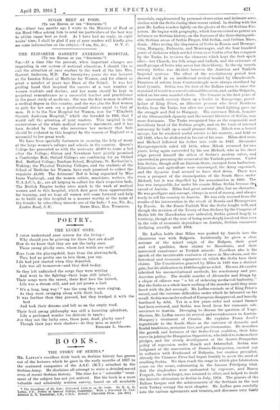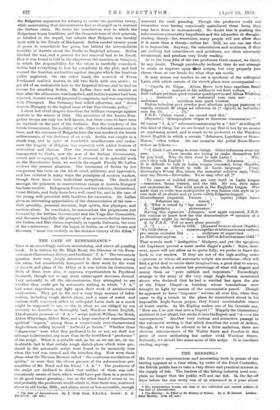BOOKS.
THE STORY OF SERBIA.*
MR. LAFFAN'S excellent little book on Serbian history has grown out of the lectures which he gave in the early months of 1917 to the scattered companies of the A.S.C. (M.T.) attached to the Serbian Army. He disclaims all attempt to write a detailed record even of recent Serbian history. The time for a " scientific" treat- ment of the subject has not yet arrived. But his book is a most valuable and admirably written survey, based on all available • The Guardians of the Gate: historical lectives on th• Serbs. By B. G. D. taffan, C.F., Fellow of Queens" College, Cambridge. With a Foreword by Vice- Admiral E. T. Trowbridge, C.M.O. Oxford: Clarendon Preen. Pa. net-1 materials, supplemented by personal observation and intimate asso- ciation with the Serbs during their recent ordeal. In dealing with the
past Mr. Laffan touches lightly on the glories of the old Serbian Em- perors. He begins with geography, which has exercised so potent an influence on Serbian history, on the features of the three distinguish.
able Serbian areas of Serbia Proper, Old Serbia, and Serbian Mace;
donia. After noting the dispersion of Serbs in Bosnia and Herzego- vina, Hungary, Dalmatia, and Montenegro, and the four hundred
years of darkness which settled down over Serbia after her conquest by the Turks, he reviews the elements which kept the Serb spirit alive—her Church, her folk songs and ballads, and the existence of small groups of Serbs who never lost theie liberty. In the eig teenth century Serbia was divided between the Austrian and Turkish Imperial systems. The effect of the revolutionary period first showed itself in an intellectual revival headed by Obradovitch. Promises of reform from Constantinople were always sterilized by local tyrants. Serbia was the first of the Balkan races to raise the standard of revolt in a war of national liberation, and, unlike Bulgaria, relied on her own unaided efforts. The ferment in the first years of the nineteenth century threw up a leader in Karageorge, grand- father of King Peter, an illiterate peasant who lived Northern Serbia from the Turks, but after ten years' hard fighting gave up the struggle and fled to Hungary. His successor Milosh, founder of the Obrenovitch dynasty and the second liberator of Serbia, was more fortunate. The Turks recognized him as the responsible and hereditary head of the Serbian people, and on the basis of internal autonomy he built up a small peasant State. Milosh was a brutal savage, but he rendered useful service to his country, and held on till 1839, when he abdicated in favour of his sons. Milan died soon. and Michael followed his father into exile in 1842. Alexander Karageorgovitch ruled till 1858, when Milosh returned for two years, being again succeeded by his son Michael, who in his short reign proved himself the ablest of Serbia's modern rulers, anaj succeeded in procuring the removal of the Turkish garrisons. Under him Serbia, though still an Eastern State, emerged from barbarism. Education and agriculture were encouraged, the Army organized, and the dynastic feud seemed to have died down. There was even a prospect of the emancipation of the South Slays under Michael, but it was dispelled by his assassination in 1868. The loss was irreparable, for under his cousin Milan Serbia became thl vassal of Austria. Milan had great natural gifts, but no character. He was profligate and corrupt, always in need of money, and always ready to sell his country to Austria. He was only rescued from the results of his intervention in the revolt of Bosnia and Herzegovina by Russia. In the Russo-Turkish War the Serbs fought well, and though the revision of the Treaty of San Stefano by the Congress of Berlin left the Macedonian sore unhealed, Serbia gained largely in territory, though at the cost of being more deeply involved than ever in the toils of economic dependence on Austria, Serbian commerce declining steadily until 1904.
Mr. Laffan holds that Milan was pushed by Austria into tho disastrous war with Bulgaria. Incidentally he gives a clear account of the mixed origin of the Bulgars, their good and evil qualities, their claims to Macedonia, and their interested connivance at Turkish misrule. Excellent also is his sketch of the inextricable confusion of races in Macedonia, and the historical and economic arguments on which the Serbs base their claims. The Constitution granted by Milan in 1885 was a distinct gain, but his abdication in 1889 brought no relief. His son Alexander inherited his unconstitutional methods, his reactionary and pro- Austrian policy. The double murder of Alexander and Drage, by a clique of officers was " a bit of sickening mediaeval barbarity." But the Serbs as a whole knew nothing of the murder until they were faced with the fait accompli. Mr. Laffan reminds us of King Peter's record, and the extreme difficulties under which he laboured on his recall. Serbia was under a cloud of European disapproval, and heavily burdened by debt. Yet in a few years order and sound finance had been restored, and Serbia was freed from her economic sub- servience to Austria. Diverging to discuss the question of Yugo- Slavism, Mr. Laffan traces its revival and recrudescence to Austria- Hungary's treatment of Croatia. He explains Franz Josef's ingratitude to the South Slays as the outcome of dynastic and feudal traditions, sectarian bias, and pro-Germanism. He describes the growth and fortunes of the Serbo-Croat coalition, their false move in joining the Hungarian Opposition, who failed to redeem their pledges, and the steady development of the Austro-Hungarian policy of repression under Rauch and Aehrenthal. Serbia was indignant at the annexation of Bosnia-Herzegovina, carried out in collusion with Ferdinand of Bulgaria, but caution prevailed. Already the Viennese Press had begun frankly to avow the need of crushing Serbia. We then reach the stage in which plot-fabricators come on the scene, culminating in the famous Friedjung trial, But the ringleaders were undaunted by exposure, and Baron Forgach, the arch-forger, was retained in office, and helped to draft the historic ultimatum to Serbia in July, 1914. The genesis of the Balkan League and the achievements of the Serbians in the war with Turkey occupy the next chapter. Mr. Latian goes carefully into the various agreements and treaties, and discusses very fairly
the Bulgarian argument for refusing to revise the partition treaty, while maintaining that circumstances had so changed as to warrant the Serbian claim. He notes the treacherous way in which the Bulgarians began hostilities, and the thrasonic tone of their generals, so falsified in the sequel, but admits that Bulgaria was harshly dealt with in the Treaty of Bucharest. Serbia needed twenty years of peace to consolidate her gains, but behind the irreconcilable hostility of Austria stood the Berlin-to-Baghdad scheme. Serbia blocked the way, and a pretext for her removal had to be found. How it was found is told in the chapter on the murders at Sarajevo, in which the responsibility for the crime is carefully examined. Serbia had everything to lose by complicity in the plot, and had warned the Austrian authorities against dangers which the Austrian police neglected. On the other hand, the removal of Franz Ferdinand enabled Austria to kill two birds with one stone : to get rid of an undesirable heir to the Imperial throne, and to find an excuse for smashing Serbia. Mr. Laffan does well to remind us that after the ultimatum was launched, and Serbia's answer had been rejected, Austria was still prepared to negotiate, and was negotiating with Petrograd. But Germany had willed otherwise, and " drove Austria-Hungary to the logical issue of her Pan-German policy."
A short but vivid chapter describes the brilliant campaign against Austria in the winter of 1914. The atrocities of the Austro-Hun- garian troops are only too well known, but there seem to have been no reprisals on the part of the Serbians. But the treachery of the Greek Government, the inability of the Allies to furnish assistance in time, and the entrance of Bulgaria into the war rendered the heroics achievements of the Serbians of no avail. Serbia was caught in a death-trap, and in spite of wonderful steadfastness and endur- ance the tragedy of Belgium was repeated, with added horrors of starvation and disease. How the remnant of her armies was transported to Corfu, now the seat of the Serbian Government, rested and re-equipped, and how it returned to do splendid work on the Macedonian front, we read in the sequel. Finally Mr. Laffan reviews the present situation. The treatment of Serbia by her conquerors has been on the whole cruel, arbitrary, and oppressive, and has violated in many ways the principles of modern warfare, though there have been individual exceptions. The death-roll amongst the prisoners in concentration camps in Austria-Hungary has been terrible. Refugees in France and her colonies, Switzerland, Great Britain, and Italy have been well cared for, and in the case of the young well provided with facilities for education. Mr. Laffan gives an interesting appreciation of the characteristics of the raoe- their geniality, personal devotion, high spirits, fine physique, and mediaevalism. In conclusion, he summarizes the programme put forward by the Serbian Government and the Yugo-Slav Committee, and discusses hopefully the prospect of an accommodation between the Italian and Slav claims, especially as regards Dalmatia, the crux of the controversy. But the hopes of Serbia, as of the Croats and Slovenes, " must rest entirely on the decisive victory of the Allies."



























 Previous page
Previous page